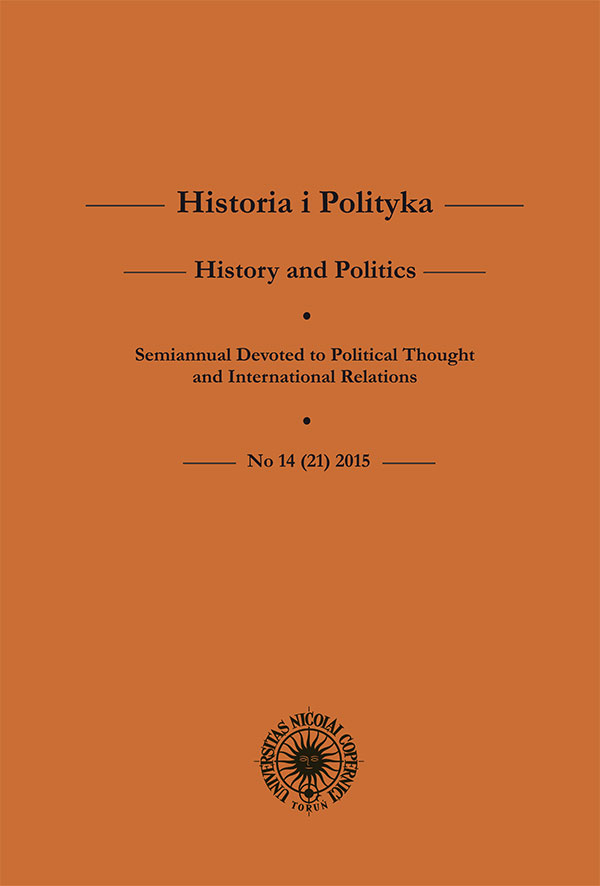Radical Islam as a Means of Self-Realization for the North Caucasian Youth: From the Terrorist-Criminal Groups to the Beginnings of the Creation of a New, Less Controlled Subculture
DOI:
https://doi.org/10.12775/HiP.2015.025Słowa kluczowe
North Caucasus, Russia, Wahhabism, terrorism, radical islam, subcultureAbstrakt
Radical Islam with its various types of manifestations is one of the significant challenges facing the modern world. This problem has also affected the societies of autonomous republics bordering Georgia to the north. In today’s North Caucasus, the activity of radical Islam followers has reached beyond the political (in many cases terrorist) niche and has acquired quasi-social characteristics. Furthermore, the facts and tendencies indicate that this part of the society (in this case youth) purposefully or unintentionally creates the so-called uncontrolled and/or less controlled subculture with different opinions, views, ideology, behaviors, in many cases clothes, hairstyle, etc. Radical Islam (in this case as a doctrine) regulates human conduct – provides advice, dictates how to act, and in fact it sets a dogma how to dress, how to behave in public, how to live, etc. Wahhabis/Salafis are forbidden to smoke tobacco, hashish, to use beads, sing loudly, dance, etc. It is worth to separately note the so-called aggressive wing of Wahhabism/Salafism or the terrorists, field commanders, etc.
One of the motives for writing the article is to show readers the fact that radical Islam in North Caucasus is not solely a terrorist activity. It encompasses a much broader spectrum of the society, and at the same time it is much more than a religion. It sets the norms of social behavior and thinking, which in itself limits the formation of subjective attitudes. Exactly the lack of the latter generates the negative trend of their activities, which quite often are used for political actions by the respective forces.
Bibliografia
F. Coene, The Caucasus: An Introduction, New York 2009.
http://lenta.ru/articles/2015/03/04/salafism/.
http://md-gazeta.ru/articles/obshchestvo/imarat_kavkaz_vmesto_epiloga/.
http://relig.info/encyclopedia/shiizm
http://scepsis.net/library/id_1121.html.
http://www.ansar.ru/analytics/v-tatarstane-preduprezhdayut-ob-ugroze-radikalnogo-islama.
M. Siddhartha, Three Essays on the Economics and Finance of Terrorism, 2007, http://www.gipe.ac.in/pdfs/working%20papers/wp10.pdf.
N. Chitadze, Main Aspects of Terrorism and Extremism in the North Caucasus Region, Journal of Social Studies 2013, Vol. 2, no. 1, pp. 5–10.
R. Borum, Psychology of Terrorism, Tampa 2004.
Radical Islam implies adherents of Salafism as well as Wahhabism, http://islam-today.ru/radical-movements/
V. Dzutsev, Moscow Likely to Choose Control of Territories Over Their Economic Development, Eurasia Daily Monitor 2015, Vol. 12, Iss. 80.
А. Акпадшахов, ВАХХАБИТЫ – ДЖИХАД ПРОТИВ РОССИИ 2008, http://www.pravoslavie.ru/analit/global/vah.htm.
А. Квахадзе, Имарат Кавказ – структура и тактика, Тбилиси 10.01.2013.
С. Маркедонов, Северный Кавказ в глобальной политике, 20 сентября 2014.
Pobrania
Opublikowane
Jak cytować
Numer
Dział
Licencja
Uniwersytet Mikołaja Kopernika w Toruniu respektuje prawo do prywatności i ochrony danych osobowych autorów.
Dane autorów nie są wykorzystywane w celach handlowych i marketingowych. Redaktorzy i recenzenci są zobowiązani do zachowania w poufności wszelkich informacji związanych ze złożonymi do redakcji tekstami.
Autor, zgłaszając swój tekst wyraża zgodę na wszystkie warunki i zapisy umowy licencyjnej (określającej prawa autorskie) z Uniwersytetem Mikołaja Kopernika w Toruniu.
Statystyki
Liczba wyświetleń i pobrań: 529
Liczba cytowań: 0



